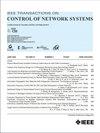基于扰动观测器的变分数阶多智能体系统非脆弱一致策略
IF 4
3区 计算机科学
Q2 AUTOMATION & CONTROL SYSTEMS
引用次数: 0
摘要
本文提出了外生扰动下变分数阶多智能体系统的非脆弱领导-追随者共识控制问题。该方法可直接应用于固定分数阶和整数阶多智能体系统。首先,引入了一种非脆弱变量分数阶扰动观测器,该观测器能够容忍一定程度的参数不确定性。其次,通过引入扰动观测器,提出了一种新的鲁棒非脆弱共识控制方案,既保证了共识误差系统的渐近稳定性,又能适应物理控制器实现中的参数不确定性。第三,利用线性矩阵不等式以及图论和李亚普诺夫理论,导出了期望共识协议的新的充分条件。最后通过仿真算例验证了理论结果的有效性。所提出的顺序相关LMI条件比现有的顺序无关LMI条件保守性更小。本文章由计算机程序翻译,如有差异,请以英文原文为准。
Nonfragile Consensus Strategy for Variable Fractional-Order Multiagent Systems Based on Disturbance Observer
This article proposes nonfragile leader–follower consensus control for variable fractional-order multiagent systems under disturbance generated by an exogenous system. The developed technique is directly applicable to fixed fractional-order and integer-order multiagent systems. First, a nonfragile variable fractional-order disturbance observer is introduced, which is able to tolerate a certain degree of parameter uncertainty. Second, by employing the disturbance observer, a novel robust nonfragile consensus control scheme is developed, which not only ensures asymptotic stability of the consensus error system, but also accommodates parameter uncertainty in the physical controller's implementation. Third, new suffi cient conditions for the desired consensus protocol are derived using linear matrix inequalities (LMIs), as well as graph and Lyapunov theory. Finally, simulation examples are presented to illustrate the validity of the theoretical results. The proposed order-dependent LMI condition is less conservative than existing order-independent alternatives.
求助全文
通过发布文献求助,成功后即可免费获取论文全文。
去求助
来源期刊

IEEE Transactions on Control of Network Systems
Mathematics-Control and Optimization
CiteScore
7.80
自引率
7.10%
发文量
169
期刊介绍:
The IEEE Transactions on Control of Network Systems is committed to the timely publication of high-impact papers at the intersection of control systems and network science. In particular, the journal addresses research on the analysis, design and implementation of networked control systems, as well as control over networks. Relevant work includes the full spectrum from basic research on control systems to the design of engineering solutions for automatic control of, and over, networks. The topics covered by this journal include: Coordinated control and estimation over networks, Control and computation over sensor networks, Control under communication constraints, Control and performance analysis issues that arise in the dynamics of networks used in application areas such as communications, computers, transportation, manufacturing, Web ranking and aggregation, social networks, biology, power systems, economics, Synchronization of activities across a controlled network, Stability analysis of controlled networks, Analysis of networks as hybrid dynamical systems.
 求助内容:
求助内容: 应助结果提醒方式:
应助结果提醒方式:


